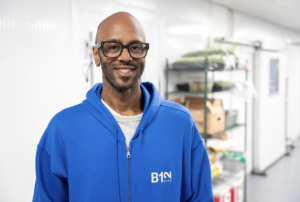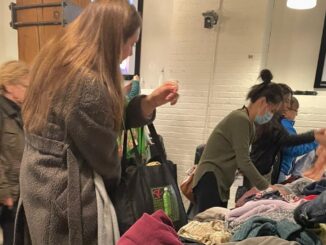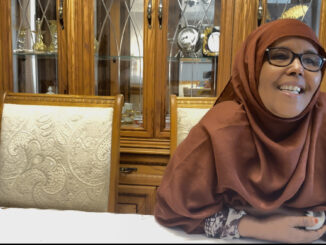You Are What You Eat With
Most plastics in Canada end up in landfills, lakes, parks, and oceans. Only 9% of plastics are recycled. According to the United Nations, it takes anywhere from 20 to 500 years for plastic to decompose. It doesn’t ever fully disappear. To date, about 8.3 billion tonnes of plastic have been created. Half of that amount has been developed in the last 13 years. It is estimated that humans inadvertently consume a credit card worth of plastic per week.
Anil Abrol is the founder of EcoGuardian. The company produces environmentally friendly and reusable food utensil alternatives to single-use plastics. Born in India, Abrol moved to Ireland when it was rated the most polluted country in Western Europe. In 2002, a 15-euro cent levy was placed on single-use plastic bags. That’s about 25 cents Canadian. The use of plastic bags dropped by 94% within weeks. Upon arriving in Canada, he was encouraged by the success he witnessed in Ireland.
When EcoGuardian was created in 2004, Abrol would sell reusable bags door-to-door with his wife in Newmarket, Ontario, just north of Toronto. His company now produces environmentally friendly alternatives to 36 different common household products distributed throughout over 130 retail partners.
EcoGuardian aligns itself with Canada’s shift away from plastics. In June 2022, the Canadian government registered their Single-use Plastics Prohibition Regulations. Banned items include checkout bags, cutlery, flexible straws, food service ware, ring carriers, stir sticks, and straws. Polystyrene and polyethylene are prohibited. Certain types of plastics are allowed – such as the non-woven polypropylene material used to create some of EcoGuardian’s reusable bags.
Anil Abrol doesn’t think it’s possible to remove all plastic from daily use, but his company aims to change the way we think about consumption.
Mentors and Motivations
Anil Abrol is driven by the urgency of the plastic pollution crisis. As Ireland faced significant pollution challenges, Abrol took note of the ways it changed the landscape. Witnessing the detrimental effects of plastic waste, he saw the potential of manufacturing reusable bags as a sustainable alternative.
When Abrol moved to Canada, he seized the opportunity to bring his vision to life. He wanted to replace single-use plastic bags with durable, eco-friendly counterparts. Thus, EcoGuardian was born – a venture driven by his commitment to environmental sustainability and a belief that the planet should be preserved for future generations.
Abrol drew inspiration from influential figures, such as Prime Minister Justin Trudeau and former Minister of Environment and Climate Change, Catherine McKenna. He says both share his passion for environmental stewardship. Abrol says their commitment to sustainable practices and advocacy for a cleaner planet, fueled his resolve to make a meaningful impact.
A pivotal moment occurred in 2008, when Abrol received encouragement from an environmental auditor. She recognized the potential for EcoGuardian to diversify its product range and expand beyond reusable bags. He embraced the challenge, broadening his vision to manufacture more eco-friendly products.
Anil Abrol’s creative rise and EcoGuardian’s success, reflect his desire to create positive change. His story is one of creative evolution, environmental responsibility, and a relentless pursuit for a sustainable future.
Treasuring Our Trash
Tony Colley, Founder and CEO of B12give (pronounced, Be One to Give), runs a business made for a circular economy. The mission of B12give is to take the extra food created by some companies and redistribute it to shelters. His company is almost entirely circular from start to finish – from where he gets the food, the packaging, and the transportation to shelters.
Colley’s business also helps other companies reduce their ecological footprint. He recognizes the harmful impact of plastic on the environment, as B12give has been plastic-free since conception.
Tony’s journey towards sustainability began with his own food insecurity struggle. After a 23-year career, Colley found himself on social assistance. He worked for a local caterer, and his very first event had more than 100 boxes of lunch left over. He realized there were many like him who needed this food. So, he took the extra food and redistributed it to a nearby shelter.
Colley saw an opportunity to build a more circular and sustainable solution to the reduction of food waste. He has now partnered with several companies: Fairmont Hotels and Resorts, Oliver and Bonacini, Shopify, Toronto Metropolitan University, and PWC.
Colley’s move towards sustainability goes beyond surplus food recovery. His company uses non-plastic packaging and is in the process of creating reusable containers.
Colley believes every small action counts. He says the collective efforts of businesses can lead to significant positive change. In fact, B12give functions by working with existing operational logistics of other companies.
When a company has a surplus of food following an event, they contact B12give via their app. The extra food is then packaged and delivered to those in need within two hours. Colley's business is needed as food banks struggle to meet demands. In March 2023, 1.9 million people visited food banks in Canada – the highest number ever recorded.
Feed Scarborough reports food bank visits have doubled since last year. Colley urges more business to use B12give, so that unsold or unused foods at an event, grocery stores, and any type of retailer, can be redistributed to feed people in the Greater Toronto Area.

From Seneca to Artevelde
Let’s head to Belgium to see how local initiatives, an ocean apart, are contributing to a global circular economy by designing out waste, repurposing or regenerating.
Too Good To Go
On the picturesque streets of Ghent, a movement is flourishing to combat food waste while uniting communities. Too Good To Go is an innovative app encouraging restaurants and food shops to rethink what they do with surplus food production. As the name suggests, the extra food, specially prepared by these eateries, is too good to be thrown in the trash. In doing so, it contributes to sustainability and conscious consumption.
Ghent, with its vibrant student population, has a special connection to the Too Good To Go movement. Students are often in search of affordable meals. The app is an economical way to obtain high-quality food. They can enjoy delicious meals from popular restaurants and shops at discounted prices, while making a positive impact on the environment.
Several eateries and shops in Ghent have joined this initiative, resulting in environmental benefits and tasty rewards for the local community. This company established its roots in this historic Belgian city, and recently branched out to North America. Since opening in 2016, the company has helped redistribute almost 200 million meals that would have been thrown out and are instead being enjoyed by their communities.
Proof in Preparation
When you look at food specially prepared to mouth-watering perfection, we are drawn to consuming every morsel. We crave it and hope to satisfy our pallets and not just our stomachs. Watching food go to waste after it has been specially curated for our tastebuds, takes an emotional toll on those who prepare it and those who could benefit from eating it.
Did you know 1.3 billion tons of food is wasted globally each year. The approximate worth? Try, $1 trillion. It’s a stark reminder there are better alternatives to the environmentally consequential impact of wasting food.
Check out the app - Too Good To Go! It partners with restaurants in a way that allows customers to discover different cuisines and support local businesses, all at a discounted price. Several restaurants in Ghent enthusiastically participate in Too Good To Go, including the Italian restaurant, Italmangia. Located in the heart of the city, Italmangia has built a reputation for serving refined Italian dishes and committing to sustainability.
There’s a growing awareness of restaurant owners in Ghent regarding their carbon footprint. By saving excess food through the app, they not only reduce waste, but also contribute to building a more sustainable and responsible food industry. This leads to a positive spiral, with more and more eateries in the city seeing the value of Too Good To Go.
The impact goes beyond food rescue; it has created a sense of community in Ghent, especially among students. Local shops and restaurants feel engaged with their community. Customers also feel like they are contributing to a greater cause. In Ghent, Too Good To Go brings together a community of conscious consumers and entrepreneurs. In the city where history and progress converge, it’s not just an app, but a movement paving the way for an environmentally-friendly future.
Meet the Team

Tharsha Ravichakaravarthy

Lanre Ogaosun

Brent Sandrie

Widmer Van der Bruggen





Be the first to comment